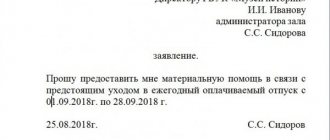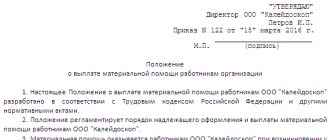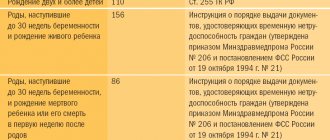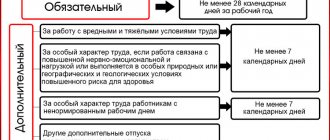Vacation for municipal employees
All employees have the right to annual paid leave and municipal employees are no exception. They are also provided with a type of leave during which their jobs are retained and vacation pay is accrued. Until recently, the length of vacation for municipal employees depended on the position the employee held. In addition, such categories of workers were provided with more additional days of rest.
Important! Law No. 25-FZ regulates the labor relations of municipal employees, according to which the duration of regular vacations, additional days of rest, as well as an allowance for vacations for irregular days are determined.
The new version of this law has reduced the allowance for employees for length of service. If previously it was 15 days, then from May 2017 it is only 10 days. All vacations are planned in advance, for which a vacation schedule is drawn up at the end of the year, determining the duration and order of vacation for employees for the next year. Such a schedule is being developed based on the requirements of the Labor Code of the Russian Federation. As with other categories of citizens, municipal employees have the right to take their vacation in parts, one of which must be at least 14 days.
In what cases should you count on additional days of rest?
Additional vacation days may be provided to an employee for the following reasons:
- for irregular working hours;
- when working in the Far North and similar areas;
- service under special conditions;
- length of service in this position.
For work without a standardized schedule, at least 3 days of additional rest per year are provided. Working in particularly dangerous conditions gives the right to use at least 7 days in addition to the main leave.
Previously, rest for length of service was provided on the basis of the following calculation - 1 day for each year of service. From 2021, the calculation looks like this in the table:
| Time spent in position (in years) | Number of vacation days |
| Up to 5 | 1 |
| From 5 to 10 | 5 |
| From 10 to 15 | 7 |
| From 15 | 10 |
For work in the Far North, a government employee is entitled to 24 days of rest, in addition to the main vacation, and paid travel. And for work equivalent to similar work, 16 additional days are provided.
When calculating rest days for the state, the sum of the days of main leave and additional (for length of service) cannot be more than 45 days.
Basic leave of a municipal employee
In 2021, the main vacation of a municipal employee is 30 days. This leave is annual and paid. For the entire rest period, the employee is accrued and paid vacation pay based on his average salary. During the entire absence, the employee retains his workplace. Until recently, the duration of such leave depended on the employee's position. Today, 30-day vacation is provided to absolutely all categories of such employees. In addition, this duration of rest is equal to the number of days of rest for civil servants (
Procedure for assigning leave
Registration of leave for a municipal employee occurs as follows:
- The employee submits an application to use his allotted vacation next year , indicating the desired periods.
- Personnel department employees and the head of the department draw up a vacation schedule taking into account the applications of all employees.
- The vacation schedule (form T-7) is signed 2 weeks before the new year.
- 2 weeks before each employee goes on vacation, a separate order is drawn up in form T-6 and adjustments are made to the working time sheet (form T-13).
- 3 days before vacation, employees are paid vacation pay.
If it is necessary to make changes to the vacation schedule during the year, this is done by a separate order by agreement of management and ordinary employees.
Long service leave for a municipal employee
This type of additional leave, such as rest for long service, is granted to employees who have worked in the municipal service for more than 1 year. Thus, the duration of additional leave will be longer, the longer the length of service. The maximum period for which an employee can take additional rest is 10 days. There is no direct gradation from the number of years to the number of days of rest in Law No. 25-FZ. This limitation is given in Law No. 79-FZ of July 27, 2004. Previously, the calculation of additional rest for municipal employees was calculated based on 1 day per 1 year of service. In 2021, how many days of rest are due to employees is calculated differently. Let's take a closer look:
| Length of service, years | Additional leave, calendar days |
| 1-5 | 1 |
| 5-10 | 5 |
| 10-15 | 7 |
| More than 15 | 10 |
Important! When determining length of service, only periods of service in state or municipal bodies are taken into account. If the employee worked for some time in private companies, it is not taken into account.
Length of service refers to the period of service that an employee worked in a municipal position. For example, 10 years of service gives the employee the right to additional rest equal to 5 days. 15 years of service will allow you to increase your rest by another 5 days. At the same time, the maximum number of days of rest in this case should not exceed 10 days. HR officers calculate the entire service time according to the employee’s work record. If the length of service is interrupted, these periods are not taken into account. The employer does not have the right to decide whether to provide such leave or not. The decision is made only by the employee; he has the right to go on vacation only for the main vacation of 30 days, and use additional days later. If an employee decides to divide his vacation into parts, then he must first agree with management.
Standardization of vacation and the exact number of its days
All presented features and innovations, according to preliminary information, will come into force in March of this year. When summing up annual leave or transferring annual paid leave to the next working year, monetary compensation may replace the part of each annual paid leave exceeding 30 calendar days, or any number of days from this part. For example, if a municipal employee is entitled to 30 days of basic leave and 4 days of additional leave, then he can only replace 4 days of additional leave with monetary compensation.
Like civil servants, municipal officials, the procedure for granting paid leave is established by Article 21 of the Federal Law of March 2, 2007 No. 25-FZ “On Municipal Service”, hereinafter referred to as Law No. 25-FZ. In addition, the procedure is regulated by the law of the subject of the federation where the municipal body is located. Additions that establish regional laws and charters of municipalities should not worsen the position of municipal employees with respect to the norms guaranteed by federal legislation.
For all municipal employees, regardless of length of service and position, paid leave consists of two parts: main and additional.
Municipal employees have the right to additional paid leave for an irregular working day, provided that an irregular working day is established for them in accordance with the official regulations of the local government body, the election commission of the municipality and the employment agreement (contract). The order in which and for what duration additional vacations are provided by the municipality are precisely established by regional laws.
According to Art. 348.10. According to the Labor Code of the Russian Federation, athletes and coaches are provided with annual additional paid leave, the duration of which is determined by collective agreements, local regulations, employment contracts, but not less than four calendar days. In general, the vacation itself must be paid no later than 3 days before it starts. If this deadline is violated, it is possible, as we already know, to reschedule the vacation, as well as to apply administrative measures. In addition, for violating the terms of payment for vacation, Art. 236 of the Labor Code of the Russian Federation provides for financial liability: the employer’s representative is obliged to pay vacation pay with interest (cash compensation) in the amount of not less than 1/300 of the refinancing rate of the Central Bank of the Russian Federation in force at that time from amounts not paid on time for each day of delay starting from the next day after the due date payments up to and including the day of actual settlement. It should be taken into account that the obligation to pay the specified monetary compensation arises regardless of the guilt of the employer’s representative.
The procedure for calculating vacation pay
All employees must be paid vacation pay before the start of their vacation. For ordinary workers, this must be done no later than three days before the start of the vacation. Such requirements are established by the Labor Code of the Russian Federation. For municipal employees, the payment period for vacation pay is different. According to Law 79-FZ, funds in the form of vacation pay must be paid to the employee no later than 10 days before the vacation. The calculation of vacation pay for employees also differs. The amounts that are taken into account as income for calculating average earnings are presented in Resolution No. 562 of 09/06/2007.
In addition to the annual salary, bonuses for assignments of particular complexity and importance, as well as financial assistance, are also taken into account. However, they are not taken into account in full, but only in 1/12 of their total amount. The rest of the calculation procedure coincides with the calculation of vacation pay made for ordinary categories of employees.
One-time payment for vacation
This payment is stimulating. It can be obtained in accordance with the terms of the collective agreement and local legislation. This payment is not available to every employee, but only to those who meet certain criteria:
- The period of work in a particular organization must be at least 12 months. Usually the framework is 1-5 years
- The employee must not be subject to disciplinary action during his or her employment.
- Sometimes legislation sets restrictions on the payment of benefits. Those who want to receive a lump sum payment should not have such restrictions.
Please remember that payment is made 3 days before the start of the vacation.
If the employee did not use the right to a lump sum payment before the vacation, then it must be received before the start of the new year. This is due to the fact that the payment is not carried over to another year. .
The amount of the payment is determined directly by the organization and can be calculated as a percentage of the salary, or (which is less common) as a coefficient, depending on how long the employee works in the organization.
Example of vacation pay calculation
Ivanov I.I. is a municipal employee. He was granted annual leave of 14 days from March 1, 2021. Ivanov is paid the following amounts monthly: salary - 16,000 rubles, bonus - 3,000 rubles, incentive - 5,000 rubles. For the previous year before his vacation, Ivanov was also paid bonuses in the amount of 20,000 rubles and financial assistance in the amount of 4,000 rubles.
Let's calculate the average salary:
16,000 + 3,000 + 5,000 + (20,000 + 4,000)/12 = 26,000 rubles
Vacation pay will be:
26,000 / 29.3 x 14 = 12,423.21 rubles
Reduction of vacation for civil servants in 2016
If you carefully study the presented new version of the bill, experts and specialists have made one general conclusion. First of all, the number of vacation days for each civil servant directly depends on three very important factors and indicators. This:
- 1.Current position.
- 2.Irregular work schedule.
- 3. Total length of service.
The application for leave must be accompanied by a document confirming that the person is successfully studying and the educational institution has state accreditation (letter from the Ministry of Health and Social Development dated 19.
All employees working under an employment agreement (contract) are granted the right to long rest, called vacation, by the legislation of the Russian Federation.
For an irregular day
Another indicator that affects the length of vacation periods is irregular working hours. Labor legislation strictly limits the number of hours a citizen must spend at work.
Expert opinion
Fedorov Nikolay Vasilievich
Lawyer with 7 years of experience. Specialization: family law. Has experience in defense in court.
In the Russian Federation, this indicator is set at 40 hours per week or 8 hours per day. Working more, in general, is not prohibited, but work performed above the norm must be paid additionally.
Officials typically work a five-day, eight-hour schedule, but many positions include the possibility of long hours.
Irregular work is considered to be work in which an employee can be involved in work during non-working hours, after the end of the working day or on weekends and holidays. There is a state list of non-standardized professions, but each organization must have its own lists of such positions in the collective agreement.
The Labor Code sets a minimum limit for additional leave, which is assigned due to an irregular schedule. The legal minimum is three days, while the article of the Labor Code makes reference to the fact that there is no maximum limit and only the employer himself has the right to determine how many days an individual employee is entitled to.
Due to the fact that budgetary organizations began to abuse this indicator and increase vacations due to it, in 2021 a restriction was imposed on this type of additional vacation. Starting from 2018, leave for irregular working hours for officials cannot exceed three days.
Advantages and disadvantages
In addition to the fact that the vacation we are considering is not paid, you also need to take into account the following:
- no insurance premiums are paid during this period, which means the pension does not increase;
- if an employee falls ill during this period, the days on which he was on vacation will be excluded from sick pay;
- despite the fact that the maximum period is not established by the legislator, in Art. 121 of the Labor Code of the Russian Federation there is a rule according to which, in the case of a vacation duration of more than 14 days, the calculation of the calendar year for assigning paid leave is shifted by the amount of the excess.
However, unpaid leave also has its positive aspects. All of them are that the employee can legally obtain release from work at any time. If, of course, the employer gives his consent and the work process at the enterprise does not suffer from this. This is a safety net for parents of frequently ill children, a chance for young fathers to be close to their family in the first days of their child’s life, and freedom for those who love to travel. You just need to remember that abuse of this right can have a negative impact on the employee’s reputation.
Is unpaid leave provided?
A period of rest without pay is provided to a civil servant upon his personal application, for personal reasons. Current legislation (Clause 15, Article 46 No. 79-FZ) indicates the possibility of taking leave for a period of no more than 12 months.
Such a request from the applicant must contain the facts of the need that has arisen, and the employer, in turn, provides guarantees to preserve the employee’s job.
There are preferential categories of employees who have the right to unpaid leave, which the employer has no right to refuse. Also, the occurrence of personal circumstances requires taking leave without pay for up to 5 days:
- wedding;
- birth of a child;
- death of a close relative.
Other issues not regulated by the Labor Code are resolved by mutual agreement of the parties. If the request of a civil servant is at odds with the interests of the employer, the manager may refuse to grant the vacation or postpone it to another period.
Duration for years of service
In government agencies, length of service is a mandatory indicator. It shows the amount of accumulated experience with the government structure. The severance of labor relations resets the length of service unless it is associated with a transfer from one state enterprise to another.
In accordance with the length of service, municipal employees are entitled to a rest period of:
- 1 day - service lasted from 1 to 5 years;
- 5 days - continuous experience is 5-10 years;
- 10 days - employee’s work experience is more than 15 years.
The changes of the year also affected additional leave for long service; it decreased from 15 days to 10. Civil servants who did not have time to take advantage of the rest or part of it can take it before the end of 2021.
Duration for irregular working hours
The Labor Code limits the rights of citizens to work. The norm is set in hours - 40 per week, that is, an 8-hour working day. It is not prohibited to work beyond the established limit, but all work must be paid.
The work schedule of a civil servant is a five-day week with an 8-hour working day. But some positions require long hours. It follows from this that a civil servant can be involved in the performance of his labor duties after the end of his working day.
The duration of leave for irregular work is clearly defined by law - 3 days. Previously, it could not be less than 3 days; municipal acts established a longer period. The legislator excluded this provision and brought it into compliance with the regulations on the state civil service.
In addition, for work in harmful and dangerous working conditions, employees are provided with additional rest of 7 days, for work in the Far North - 24 days.
The legislative framework
When determining the duration of vacations for civil servants, one should focus on the provisions of the Federal Law “On the State Civil Service of the Russian Federation” No. 79-FZ of July 27, 2004. It was last modified on December 28, 2021. New amendments have adjusted the vacation provided and reduced it in several respects.
The tightening of legislative norms occurred due to the need to save budget funds. Starting from 2021, the position of officials has ceased to be a determining factor for the duration of rest; now all civil servants are equal in their original rights.
Although the main document regulating paid vacation periods is Federal Law 79, the norms of the Labor Code of the Russian Federation are not repealed. In some cases not provided for by law, it should be regulated by the Labor Code.










